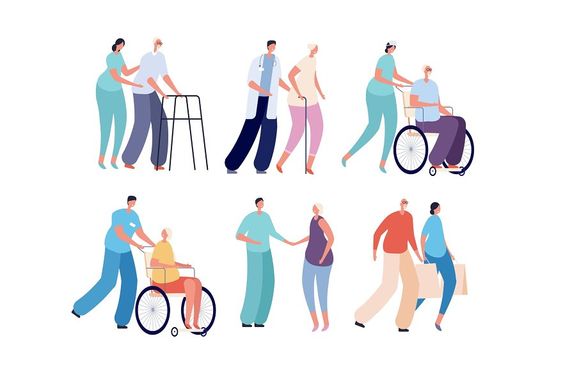
Table of Contents
The world of nursing is vast and diverse, encompassing a multitude of specialties and disciplines that cater to the unique needs of patients across the lifespan. For aspiring nurses, navigating this complex landscape and understanding the key nursing disciplines and specialties offered in nursing school is essential. This journey begins with a foundational understanding of the core principles and skills shared by all nurses, and then branches out into specialized areas that align with individual interests and career aspirations.
Foundational Nursing Disciplines and Specialties: The Common Ground of Nursing
Before delving into the diverse realm of nursing specialties, it’s crucial to understand the core principles and skills that form the foundation of all nursing disciplines. These foundational disciplines provide the essential framework for providing safe, effective, and compassionate patient care.

- Fundamentals of Nursing: This discipline lays the groundwork for all other nursing specialties. It covers the basic principles of patient care, including vital sign assessment, medication administration, wound care, infection control, and basic patient communication.
- Medical-Surgical Nursing: This discipline focuses on the care of patients with a wide range of medical and surgical conditions. It requires a deep understanding of various diseases, surgical procedures, and their impact on patient health.
- Nursing Informatics: In an increasingly digital healthcare landscape, nursing informatics plays a critical role. This discipline focuses on the use of technology in nursing practice, including electronic health records, data analysis, and patient education through technology.
- Nursing Research: This discipline emphasizes the scientific approach to nursing practice. It involves conducting and interpreting research studies, analyzing data, and applying research findings to improve patient care.
Specialized Paths: Exploring the World of Nursing Specialties
While the foundational disciplines provide the essential skills for nursing practice, the world of nursing specialties offers a wide range of opportunities for nurses to specialize in areas that align with their interests and passions. Here are some of the key nursing disciplines and specialties offered in nursing school:
1. Critical Care Nursing:
This specialty focuses on the care of critically ill patients in specialized units like intensive care units (ICUs). Critical care nurses possess advanced skills in monitoring vital signs, managing complex medical equipment, and providing life-saving interventions. They work closely with physicians and other healthcare professionals to provide comprehensive care for patients in critical condition.
- Cardiac Intensive Care Nursing (CICN): This specialization focuses on the care of patients with heart conditions, including those who have undergone heart surgery or are experiencing heart failure.
- Neurological Intensive Care Nursing (NICN): This specialization focuses on the care of patients with neurological disorders, such as stroke, traumatic brain injury, and spinal cord injuries.
- Trauma Intensive Care Nursing: This specialization focuses on the care of patients with severe injuries, often due to accidents or violence.
2. Emergency Nursing:

Emergency nursing also falls under the key nursing disciplines and specialties. The nurses work in the fast-paced environment of emergency departments, providing immediate care to patients experiencing a wide range of medical emergencies. They possess advanced skills in triage, assessment, stabilization, and management of acute illnesses and injuries. They are trained to handle life-threatening situations and work effectively under pressure.
- Pediatric Emergency Nursing: This specialization focuses on the care of children experiencing medical emergencies.
- Trauma Emergency Nursing: This specialization focuses on the care of patients with traumatic injuries.
3. Pediatric Nursing:
This branch of nursing disciplines and specialties focuses on the care of infants, children, and adolescents. Pediatric nurses possess a deep understanding of child development, common childhood illnesses, and specialized pediatric interventions. They provide compassionate care to children and their families, helping to navigate the complexities of childhood health.
- Neonatal Intensive Care Nursing (NICU): This specialization focuses on the care of premature and critically ill newborns.
- Pediatric Oncology Nursing: This specialization focuses on the care of children with cancer.
4. Mental Health Nursing:

This specialty focuses on the care of patients with mental health disorders, including depression, anxiety, schizophrenia, and bipolar disorder. Mental health nurses provide therapeutic interventions, medication management, and support to patients and their families. They work in a variety of settings, including hospitals, clinics, and community mental health centers.
- Psychiatric Nursing: This specialization focuses on the care of patients with severe mental illness.
- Forensic Nursing: This specialization focuses on the care of victims of crime and violence.
5. Obstetrics and Gynecology Nursing:
This is also among the common nursing disciplines and specialties that focuses on the care of women throughout their reproductive years, from pregnancy and childbirth to menopause. Obstetrics and gynecology nurses provide care during prenatal appointments, labor and delivery, and postpartum recovery. They also provide specialized care for women with gynecological conditions.
- Labor and Delivery Nursing: This specialization focuses on the care of women during labor and delivery.
- Postpartum Nursing: This specialization focuses on the care of women after childbirth.
6. Public Health Nursing:
This specialty focuses on promoting health and preventing disease in communities. Public health nurses work in a variety of settings, including schools, clinics, and community centers. They provide education, screening, and outreach services to improve the health and well-being of individuals and communities.
- Community Health Nursing: This specialization focuses on providing health care services to individuals and families within their communities.
- School Nursing: This specialization focuses on providing health care services to students in school settings.
7. Geriatric Nursing:

This specialty focuses on the care of older adults. Geriatric nurses provide specialized care for patients with age-related conditions, including dementia, heart disease, and arthritis. They work in a variety of settings, including hospitals, nursing homes, and assisted living facilities.
- Hospice Nursing: This specialization focuses on providing palliative care to terminally ill patients and their families.
- Long-Term Care Nursing: This specialization focuses on providing care to individuals who require long-term care, such as those living in nursing homes or assisted living facilities.
8. Wound Care Nursing:
This specialty focuses on the management and treatment of wounds, from simple cuts and scrapes to complex surgical wounds. Wound care nurses possess specialized knowledge of wound healing processes, infection control, and wound care products. They work in a variety of settings, including hospitals, clinics, and home health agencies.
- Ostomy Nursing: This specialization focuses on the care of patients with ostomies, which are surgical openings in the body that allow waste to be eliminated.
9. Telehealth Nursing:

This specialty utilizes technology to provide remote health care services. Telehealth nurses use video conferencing, phone calls, and other technology to provide patient care, education, and monitoring. This allows nurses to reach patients in rural or underserved areas, as well as to provide follow-up care to patients after hospital discharge.
Choosing Your Path: Matching Your Passion with Nursing Specialties
Choosing nursing disciplines and specialties is a big decision. It’s about more than just a job; it’s about finding a career that aligns with your passions, skills, and values. Here are some tips to consider when selecting suitable nursing disciplines and specialties;
1. Reflect on Your Interests and Skills:
- What are you passionate about? Do you enjoy working with children, the elderly, or specific medical conditions?
- What are your strengths? Are you detail-oriented, empathetic, a critical thinker, or a natural leader?
- What type of work environment do you prefer? Do you thrive in fast-paced settings or prefer a calmer, more predictable environment?
2. Explore Different Nursing Disciplines and Specialties:
- Research various disciplines and specialties. There are countless options, ranging from critical care to community health, mental health to pediatrics, and more.
- Read about different roles, responsibilities, and required skills. Consider talking to nurses in different disciplines and specialties to get their perspectives.
3. Shadow or Volunteer in Different Settings:
- Gain hands-on experience. Shadowing nurses in different settings can help you see firsthand what their daily routines are like and if it’s something you’d enjoy.
- Volunteer in a healthcare setting. This is another great way to experience different nursing disciplines and specialties.
4. Consider Your Career Goals:
- Do you want to specialize further? Many nursing disciplines and specialties offer advanced specialization opportunities, such as becoming a certified nurse practitioner or a certified registered nurse anesthetist.
- Do you want to pursue a leadership role? Some nursing disciplines and specialties also offer more opportunities for advancement.
5. Don’t Be Afraid to Change Your Mind:
- Choosing nursing disciplines and specialties is a journey, not a destination. You may change your mind as you learn and gain more experience.
- It’s never too late to explore new options. Be open to new opportunities and don’t be afraid to try something different.

By taking the time to explore different nursing disciplines and specialties, you’ll be better equipped to make an informed decision about your career path. Remember, the most important thing is to choose a specialty that you’re passionate about and that allows you to thrive.
Things to Avoid When Choosing Nursing Disciplines and Specialties
Choosing nursing disciplines and specialties is a big decision, and there are several factors to consider to ensure you pick a path that’s a good fit for you. Here are some things to avoid when selecting nursing disciplines and specialties.
1. Choosing Based Solely on Salary or Prestige:
- Don’t let money be the primary driver. While salary is important, it shouldn’t be the sole reason you choose a specialty.
- Be wary of “prestigious” fields. These often come with more stress, competition, and demanding work schedules. Consider if the benefits outweigh the challenges for you.
2. Ignoring Your Interests and Skills:
- Don’t pick a specialty you’re not passionate about. Nursing requires dedication and resilience. If you’re not genuinely interested in the patient population or the work itself, you’re less likely to be happy and successful.
- Be honest about your strengths and weaknesses. Some specialties require specific skills or personality traits. Choose a field where you can excel and feel confident.
3. Making Assumptions Based on Limited Exposure:
- Don’t rely solely on what you’ve seen on TV or heard from others. Experience the different specialties firsthand through shadowing, volunteering, or talking to nurses in those fields.
- Be aware of your biases. Your personal experiences and perspectives can influence your choices. Try to approach the decision with an open mind.
5. Neglecting Your Mental and Physical Health:
- Don’t choose nursing disciplines and specialties that will put you at risk for burnout or emotional exhaustion. Consider the emotional toll and potential for stress in each field.
- Be aware of the physical demands. Some nursing disciplines and specialties require heavy lifting, prolonged standing, or exposure to hazardous materials.
6. Not Considering Future Goals:
- Don’t choose a specialty that limits your future options. Think about your long-term goals and aspirations. Some specialties offer more opportunities for advanced practice or research.
- Consider the job market. Some specialties are more saturated than others. Research the job outlook and potential for career growth.
It’s important to remember:
- This is a personal journey. What works for one nurse might not work for another.
- You can always change your mind. Nursing offers a wide range of opportunities.
- Seek advice from experienced nurses. They can offer valuable insights and guidance.
By carefully considering these points and exploring the options available, you can make an informed decision and choose a nursing specialty that aligns with your values, skills, and aspirations.
Exploring Opportunities in Nursing School
Nursing school provides an invaluable opportunity to explore the diverse world of nursing disciplines and specialties. Many schools offer elective courses and clinical rotations in various specialties, allowing students to gain firsthand experience and make informed decisions about their future career paths.

- Electives: Choose electives that align with your interests and career aspirations.
- Clinical Rotations: Utilize clinical rotations to gain experience in different specialties and observe the day-to-day realities of each practice area.
- Shadowing: Seek opportunities to shadow experienced nurses in different specialties to gain valuable insights into their roles and responsibilities.
Continuing Education: A Lifetime of Learning in Nursing
The journey of a nurse is a continuous process of learning and growth. After graduating from nursing school, many nurses continue their education by pursuing advanced degrees, certifications, and specializations. These advanced credentials enhance their skills and knowledge, enabling them to specialize in specific areas of practice.
- Master’s Degrees: A master’s degree in nursing (MSN) can lead to roles such as nurse practitioner, nurse educator, or nurse researcher.
- Certifications: Specialty certifications demonstrate advanced knowledge and skills in specific areas of nursing practice.
- Specializations: As nurses gain experience, they may choose to specialize further within their chosen specialty.
The Future of Nursing: Embracing Diversity and Innovation
The nursing profession is constantly evolving, driven by advances in technology, changing healthcare needs, and growing global health challenges. New nursing disciplines and specialties are emerging, reflecting the evolving landscape of patient care. The future of nursing promises exciting opportunities for nurses to embrace innovation and make a meaningful difference in the lives of patients and communities.

Navigating the diverse world of nursing disciplines and specialties is an exciting journey for aspiring nurses. By understanding the foundational principles of nursing and exploring the various specialty areas, nurses can identify the path that best aligns with their interests, skills, and values. Through continuous learning and professional growth, nurses can make a significant impact on the lives of patients, their families, and communities around the world.
Professional Nursing Assignment Writing Services
Regardless of the particular nursing disciplines and specialties that you choose to pursue, there are various types of assignments that you will be expected to write in school. At Nursing Papers, we offer the best nursing assignment writing services for undergraduate, Degree, Master’s and PhD levels. Talk to us today for high quality nursing essays, research papers, case studies and dissertations.







